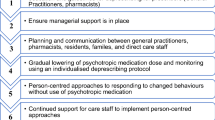Abstract
When managing behavioural changes in individuals with dementia in long-term care settings, non-pharmacological approaches should be the first-line option. However, evidence indicates that psychotropic medications are prescribed excessively in this patient population. Psychotropics can be successfully deprescribed by gradually withdrawing treatment, by taking a person-centred approach that actively involves residents, their family/support persons and multidisciplinary teams, by ensuring healthcare staff are well trained and supported by management, and by employing effective communication strategies.

Similar content being viewed by others
References
Harrison SL, Cations M, Jessop T, et al. Approaches to deprescribing psychotropic medications for changed behaviours in long-term care residents living with dementia. Drugs Aging. 2019;36(2):125–36.
Westbury J, Gee P, Ling T, et al. More action needed: psychotropic prescribing in Australian residential aged care. Aust N Z J Psychiatry. 2019;53(2):135–47.
Zhao Q-F, Tan L, Wang HF, et al. The prevalence of neuropsychiatric symptoms in Alzheimer’s disease: systematic review and meta-analysis. J Affect Disord. 2016;190:264–71.
Nørgaard A, Jensen-Dahm C, Gasse C, et al. Psychotropic polypharmacy in patients with dementia: prevalence and predictors. J Alzheimers Dis. 2017;56(2):707–16.
Banerjee S. The use of antipsychotic medication for people with dementia: time for action. A report for the Minister of State for Care Services United Kingdom Department of Health. London: Department of Health & Social Care; 2009.
Declercq T, Petrovic M, Azermai M, et al. Withdrawal versus continuation of chronic antipsychotic drugs for behavioural and psychological symptoms in older people with dementia. Cochrane Database Syst Rev. 2013;4:CD007726.
Tampi RR, Tampi DJ, Balachandran S, et al. Antipsychotic use in dementia: a systematic review of benefits and risks from meta-analyses. Ther Adv Chronic Dis. 2016;7(5):229–45.
Laver K, Cumming RG, Dyer SM, et al. Clinical practice guidelines for dementia in Australia. Med J Aust. 2016;204(5):191–3.
Buterbaugh WM, Jamrose T, Lazzara J, et al. Review of antidepressants in the treatment of behavioral and psychiatric symptoms in dementia (BPSD). Ment Health Clin. 2014;4(4):183–8.
Rosenberg PB, Martin BK, Frangakis C, et al. Sertraline for the treatment of depression in Alzheimer disease. Am J Geriatr Psychiatry. 2010;18(2):136–45.
Banerjee S, Hellier J, Dewey M, et al. Sertraline or mirtazapine for depression in dementia (HTA-SADD): a randomised, multicentre, double-blind, placebo-controlled trial. Lancet. 2011;378(9789):403–11.
Defrancesco M, Marksteiner J, Fleischhacker WW, et al. Use of benzodiazepines in Alzheimer’s disease: a systematic review of literature. Int J Neuropsychopharmacol. 2015;18(10):pvy055.
Tible OP, Riese F, Savaskan E, et al. Best practice in the management of behavioural and psychological symptoms of dementia. Ther Adv Neurol Disord. 2017;10(8):297–309.
Dyer SM, Harrison SL, Laver K, et al. An overview of systematic reviews of pharmacological and nonpharmacological interventions for the treatment of behavioral and psychological symptoms of dementia. Int Psychogeriatr. 2018;30(3):295–309.
Orgeta V, Qazi A, Spector A, et al. Psychological treatments for depression and anxiety in dementia and mild cognitive impairment: systematic review and meta-analysis. Br J Psychiatry. 2015;207(4):293–8.
Plakiotis C, Bell JS, Jeon YH, et al. Deprescribing psychotropic medications in aged care facilities: the potential role of family members. Adv Exp Med Biol. 2015;821:29–43.
Brodaty H, Aerts L, Harrison F, et al. Antipsychotic deprescription for older adults in long-term care: the HALT study. J Am Med Dir Assoc. 2018;19(7):592–600.e7.
Royal Australian & New Zealand College of Psychiatrists. Antipsychotic medications as a treatment of behavioural and psychological symptoms of dementia. Melbourne: Royal Australian & New Zealand College of Psychiatrists; 2016.
Alldred DP, Kennedy MC, Hughes C, et al. Interventions to optimise prescribing for older people in care homes. Cochrane Database Syst Rev. 2016;2:Cd009095.
Fossey J, Ballard C, Juszczak E, et al. Effect of enhanced psychosocial care on antipsychotic use in nursing home residents with severe dementia: cluster randomised trial. BMJ. 2006;332(7544):756–61.
Jennings AA, Foley T, Walsh KA, et al. General practitioners’ knowledge, attitudes, and experiences of managing behavioural and psychological symptoms of dementia: a mixed-methods systematic review. Int J Geriatr Psychiatry. 2018;7(1):62.
Chenoweth L, Forbes I, Fleming R, et al. PerCEN: a cluster randomized controlled trial of person-centered residential care and environment for people with dementia. Int Psychogeriatr. 2014;26(7):1147–60.
Barry MJ, Edgman-Levitan S. Shared decision making—pinnacle of patient-centered care. N Engl J Med. 2012;366(9):780–1.
Kales HC, Gitlin LN, Lyketsos CG. Assessment and management of behavioral and psychological symptoms of dementia. BMJ. 2015;350:h369.
Turner JP, Edwards S, Stanners M, et al. What factors are important for deprescribing in Australian long-term care facilities? Perspectives of residents and health professionals. BMJ Open. 2016;6(3):e009781.
Jansen J, Naganathan V, Carter SM, et al. Too much medicine in older people? Deprescribing through shared decision making. BMJ. 2016;353:i2893.
Rendina N, Brodaty H, Draper B, et al. Substitute consent for nursing home residents prescribed psychotropic medication. Int J Geriatr Psychiatry. 2009;24(3):226–31.
Sawan M, Jeon YH, Fois RA, et al. Exploring the link between organizational climate and the use of psychotropic medicines in nursing homes: a qualitative study. Res Soc Adm Pharm. 2017;13(3):513–23.
Author information
Authors and Affiliations
Consortia
Ethics declarations
Conflict of interest
The article was adapted from Drugs & Aging (2019) 36(2):125–36 [1] by employees of Adis International Ltd./Springer Nature, who are responsible for the article content and declare no conflicts of interest.
Funding
The preparation of this review was not supported by any external funding.
Rights and permissions
About this article
Cite this article
Adis Medical Writers. Personalize protocols when deprescribing psychotropics used to manage behavioural changes in individuals with dementia. Drugs Ther Perspect 35, 424–428 (2019). https://doi.org/10.1007/s40267-019-00655-3
Published:
Issue Date:
DOI: https://doi.org/10.1007/s40267-019-00655-3




